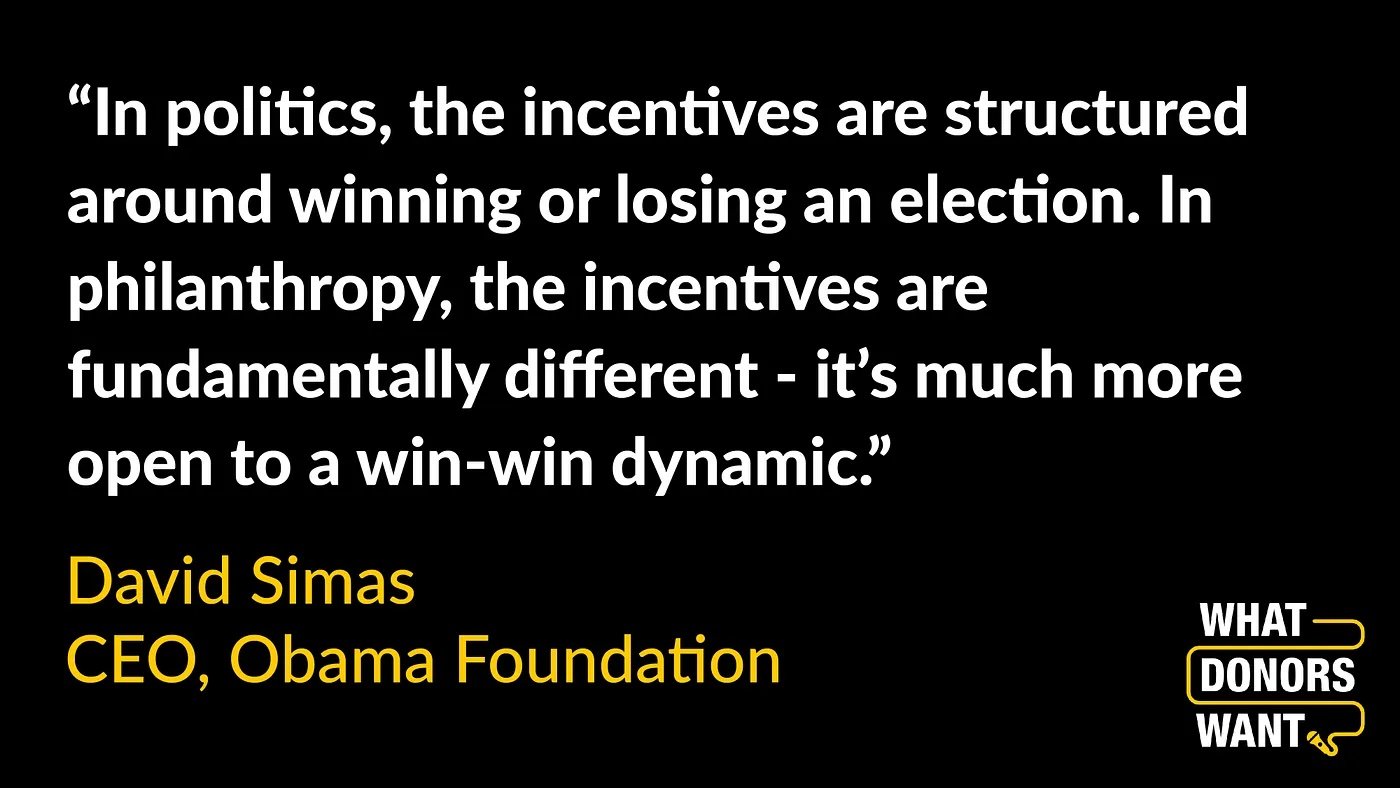What Donors Want — Exploring Politics and Philanthropy with David Simas, CEO of the Obama Foundation

Podcast listeners — a new episode of What Donors Want is out! We had the honour of speaking with David Simas, CEO of the Obama Foundation.
If you haven’t tuned in, What Donors Want is a podcast by I.G. Advisors, which offers a fresh, dynamic (and slightly irreverent) view into major gifts fundraising and philanthropy from the donor’s perspective. We are proud to have Alliance magazine as our Media Partner, and will be sharing insights on this platform.
The Obama Foundation, of course, needs no introduction. It’s the philanthropic legacy of former US President and former First Lady, Barack and Michelle Obama — and its mission is to inspire, empower and connect people to change their world. Our guest, CEO David Simas, has had a remarkable career — notably, he joined the Obama Administration in 2009 as Deputy Assistant to the President, and during the Administration’s second term served as Assistant to the President, and Director of the Office of Political Strategy and Outreach.
As soon as we connected with David, it was clear he was a brilliant leader and storyteller. We were enraptured by his journey, career and, naturally, his connection to the Obama family. He describes being called into the Oval Office by Barack, and being asked to lead the Foundation. The thrill and humility of this responsibility, and their shared passion for cultivating the next generation of civic leaders.
It wasn’t lost on us that we spoke with David during an extremely pertinent time — our interview was one week after the 2020 US Presidential Election, and as I write this, Joe Biden’s inauguration is approaching next week. Democracy, the integrity of political systems, and the responsibility of governments are centre stage in the global zeitgeist. It was the perfect moment to explore the fascinating relationship between politics and philanthropy, and our collective civic duties.
When asked how working in philanthropy differs from working in politics, David stressed the importance of incentives: “In politics, the incentives are structured around winning or losing an election. In philanthropy, the incentives are fundamentally different — it’s much more open to a win-win dynamic.” The constant need to secure re-election is an unavoidable reality of public office, and David’s right that this can be different in philanthropy — depending on where you sit.
While an ‘I win/you lose’ mindset won’t get you very far in philanthropy, I couldn’t help but draw parallels between the dynamic of political campaigning, and the dynamic of philanthropic fundraising. Political candidates leveraging their personal stories and values to connect with voters. Taking strong stances on aligned issues, and diplomatically dancing around others. Non-profits telling impact stories to draw in donors without being too ‘controversial’. Always trying to keep donors engaged, and balancing this with the interests of the communities they’re trying to stand in solidarity with. With the right donors, this balance is easy (and unrestricted, and multi-year), but that’s not always the case.
As we discuss on the show, philanthropy is only as strong as the people who participate in it, and the way resources are distributed is just as important as the causes resources are distributed to. When power remains exclusively in the hands of donors, the incentives between public office and public sector aren’t always so different, but when that `win-win` dynamic is achieved — that is philanthropy magic.
Speaking with David was an immense honour, and one of the most inspiring conversations we’ve had on the podcast. You can hear the entire conversation between me, Carlos Miranda and David Simas by subscribing to What Donors Want. And stay tuned for our next episode coming soon.
Originally published at https://www.alliancemagazine.org on January 15, 2021.
Late last year, a few of us in the Collective Leadership Group began exploring how GenAI could support leadership and development in the social impact space.
We found it could grasp the unique challenges social leaders face and uncover relevant learning resources we hadn’t seen before. Its potential to empower underrepresented and underserved changemakers quickly became clear…
Institutions don’t drive change. People do. People are the idea generators, project implementers, and system shakers. Yet, while we often talk about the importance of investing in organisations, we rarely think about investing in the people who lead them.
Since March 2022, I.G. Advisors has worked closely with Kurt Geiger to design and implement Business by Design—a fully-funded, AQA-accredited programme co-created with young people to drive access, opportunity, and equity in the creative industries. This isn’t a side initiative—it’s embedded in how the business operates.
As we close the chapter on 2024 and step into a new year, our Advisor, Harriette, finds herself reflecting on what’s needed to move philanthropy forward in 2025.
It’s not a groundbreaking revelation that staff wellbeing and burnout are huge challenges our sector is facing right now, and the sector-wide lack of investment in professional development has a lot to answer for.
Our Associate Advisor Charly makes the case that greater investment in your grantmaking team = greater impact for your organisation, and beyond.
While philanthropy and football may seem worlds apart, I’ve started thinking about the many similarities that can provide valuable lessons for those in the philanthropic sector. I for one, am always learning about the essential elements of football that can inspire and inform effective philanthropy.
Through the power of collective design, our fundraiser and grantmaker #FixTheFlow Fellows have imagined the future of our philanthropic funding system, and we should all listen carefully.
In the coming months, our Associate Carli is exploring the complexities of social innovation and will share her learnings, insights, and questions with you.
I.G.’s CEO Emily shares some of the mistakes and challenges she found during her leadership journey, and what she learned and will share in I.G.’s new Leadership Lab.
I’m expected to show up as a leader, but don’t feel like a leader. Introducing Impact & Grow: A Leadership Lab.
Leveraging Limited Funds For Humanitarians: Insights from the 2024 #HX24 conference, organised by Save the Children UK and the Humanitarian Leadership Academy.
Social enterprises have a particularly interesting relationship with Monitoring, Evaluation and Learning (MEL) as they need to capture both the financial and social/ environmental impact of their work, and speak to a wide range of potential funders and investors. Caitlin McLoughlin chatted to Abhinav Khanal, Co-Founder and Executive Director of Bean Voyage, to explore this further.
Image Credit: Bean Voyage
A round up of everything the I.G. team did in 2023!
Introducing a new, dedicated funders stream to I.G.’s #FixTheFlow Fellowship! We’re accepting applications until 17th November (for a 2024 start). Join our movement at fixtheflow.org
Join us for one (or all!) our eight workshops in our Autumn Training Series, where we will cover some of the trickiest topics facing fundraisers today.
What does meaningful and effective learning actually mean in practice?
Our Advisor Caitlin interviews Kore Global’s Emily Boost on learning how to learn and all things feminist evaluation and learning.
How do we balance our passion and our desire to give our best, whilst not being consumed by failure to live up to our own or others’ expectations?
At I.G. Advisors (I.G.), we’re often approached to design and implement evaluations for our clients to understand the impact of their grantmaking, fundraising or programmatic strategies, and identify opportunities for evolution.
The ‘lone saviour’ approach won’t cut it (and it also might destroy you).
It’s hard to believe it now that we’re living through a polycrisis, but the financial crisis and Great Recession of the 00s felt like a once-in-a-lifetime jolt to the world order at the time.
What you can learn from others leading philanthropic networks like yours
‘Well, we could have called that one.’
I.G. Advisors (I.G.) recently had the pleasure of collaborating with The Big Give and Rosa on the Women and Girls Match Fund.
Being a parent is often a thankless task. You take something and nurture it, treating it with love and care, losing sleep and worrying if — against all odds — , it will achieve its full potential and become the best it can be. It may never, ever show gratitude for your sacrifice. And then one day it will grow up and leave.
New I.G. Insights report explores how fundraisers and funders can support digital fundraising for racial justice issues.
#TaxPhilanthropy — wealth holders have the power to pay more tax right now even if governments fail to reform their policies
Senior Social Impact Advisor (I.G. Advisors & Lightful)






























